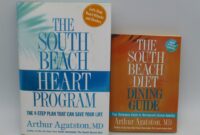Fast Beach Diet: The pursuit of a “beach-ready” physique often leads to intense, rapid weight loss strategies. However, achieving a healthy and sustainable body composition requires a nuanced understanding of nutrition, exercise, and mental well-being. This exploration delves into the various interpretations of “fast beach diets,” examining popular plans, their claims, and potential health risks. We’ll navigate the complexities of quick weight loss versus long-term sustainable strategies, emphasizing the importance of a balanced approach to health and fitness.
This guide aims to provide a comprehensive overview of the fast beach diet phenomenon, separating fact from fiction and promoting responsible approaches to weight management. We’ll analyze the nutritional aspects of popular quick-weight-loss diets, discuss the crucial role of exercise and hydration, and address the often-overlooked importance of mental health in the pursuit of a healthy lifestyle. Ultimately, our goal is to empower you with the knowledge to make informed choices about your health and well-being.
Mental and Emotional Well-being
Rapid weight loss diets, while potentially achieving short-term results, can significantly impact mental and emotional well-being. The restrictive nature of such diets often leads to feelings of deprivation, anxiety, and irritability, impacting overall mood and potentially exacerbating existing mental health conditions. Furthermore, societal pressures and the pursuit of an idealized body image frequently contribute to negative self-perception and body dissatisfaction, which can be intensified by the focus on weight loss inherent in these diets.
The psychological impact of restrictive dieting extends beyond temporary mood swings. Studies have linked restrictive dieting to increased rates of depression, anxiety disorders, and eating disorders, particularly in individuals predisposed to such conditions. The constant focus on food and weight can become all-consuming, hindering participation in other aspects of life and impacting relationships. Body image issues, often fueled by unrealistic media portrayals, can lead to low self-esteem and a diminished sense of self-worth, further complicating the process of healthy weight management.
Maintaining a Positive Body Image and Promoting Self-Acceptance
Cultivating a positive body image requires a shift in perspective from focusing solely on physical appearance to appreciating the overall functionality and capabilities of the body. This involves challenging negative self-talk, recognizing individual strengths and accomplishments beyond physical attributes, and actively engaging in self-compassion. Surrounding oneself with supportive individuals who value and appreciate one’s intrinsic worth, rather than solely focusing on appearance, is crucial. Furthermore, engaging in activities that promote self-care and foster a sense of accomplishment, such as pursuing hobbies, spending time in nature, or practicing mindfulness, can help to build self-esteem and resilience.
Incorporating Mindfulness Techniques to Manage Stress and Emotional Eating
Mindfulness practices, such as meditation and deep breathing exercises, can be powerful tools in managing stress and emotional eating. These techniques help to increase self-awareness, allowing individuals to identify triggers for emotional eating and develop healthier coping mechanisms. By cultivating present moment awareness, individuals can become more attuned to their physical and emotional states, distinguishing between true hunger and emotional cravings. This heightened self-awareness enables a more mindful approach to food choices, promoting healthier eating habits and reducing reliance on food as a means of managing stress or negative emotions. For example, practicing mindful eating – paying close attention to the taste, texture, and smell of food without distractions – can transform the eating experience from a mindless habit into a conscious and enjoyable activity. Regular practice of mindfulness techniques can significantly reduce stress levels, improve emotional regulation, and ultimately support sustainable weight management.
Potential Health Concerns
Rapid weight loss diets, while appealing for their promise of quick results, can pose significant health risks if not approached cautiously. The body’s natural processes are disrupted by drastic calorie restriction, potentially leading to various complications. Understanding these potential risks is crucial for making informed decisions about your health and well-being.
Rapid weight loss often results in electrolyte imbalances. Electrolytes, such as sodium, potassium, and magnesium, are essential for maintaining proper fluid balance, nerve function, and muscle contractions. Severe electrolyte imbalances can lead to symptoms like fatigue, muscle weakness, irregular heartbeat, and in severe cases, even death. Nutrient deficiencies are another significant concern. Crash diets frequently lack the variety of foods needed to provide the full spectrum of vitamins and minerals required for optimal health. This can lead to fatigue, weakened immunity, hair loss, and other health problems.
Electrolyte Imbalances and Nutrient Deficiencies
Electrolyte imbalances can manifest in several ways, depending on the specific electrolyte affected. For example, low potassium (hypokalemia) can cause muscle weakness, cramps, and fatigue. Low sodium (hyponatremia) can lead to headaches, nausea, confusion, and seizures. Similarly, nutrient deficiencies can result in a wide range of symptoms. A deficiency in iron, for example, can cause anemia, leading to fatigue and weakness. Vitamin D deficiency can weaken bones, increasing the risk of fractures. These deficiencies can be particularly problematic in individuals who already have underlying health conditions. For instance, someone with a pre-existing heart condition might experience more severe complications from an electrolyte imbalance. A person with a history of osteoporosis may be more susceptible to bone fractures due to vitamin D deficiency. Therefore, it’s vital to approach weight loss in a manner that supports overall health rather than compromising it.
Importance of Consulting a Healthcare Professional
Before embarking on any weight loss program, especially one involving rapid weight loss, consulting a healthcare professional is paramount. A doctor or registered dietitian can assess your individual health status, identify potential risks, and help you develop a safe and effective plan. They can also monitor your progress and address any health concerns that may arise. Ignoring professional advice can have serious consequences, potentially exacerbating existing health issues or creating new ones. For example, someone with diabetes might need to adjust their medication regimen during weight loss, and a doctor can provide guidance on this. Similarly, individuals with heart conditions need careful monitoring to avoid potentially dangerous cardiac events. Personalized guidance is essential for safe and effective weight management.
Resources for Reliable Information
Numerous reliable resources offer guidance on healthy eating and weight management. The websites of reputable organizations like the Academy of Nutrition and Dietetics, the American Heart Association, and the National Institutes of Health provide evidence-based information. These resources offer comprehensive information on nutrition, healthy recipes, and strategies for sustainable weight loss. It’s crucial to be discerning about the information you find online, as not all sources are credible. Look for information backed by scientific evidence and avoid fad diets or miracle cures. Consulting a registered dietitian or a healthcare professional is also a valuable way to ensure you are getting accurate and personalized advice. This will enable you to make informed choices and avoid potentially harmful approaches to weight loss.
Final Summary
Ultimately, the “fast beach diet” concept highlights the complexities of achieving and maintaining a healthy weight. While rapid weight loss may seem appealing, sustainable strategies that prioritize nutrition, exercise, and mental well-being are far more effective in the long run. This balanced approach not only helps you achieve your fitness goals but also safeguards your health and fosters a positive relationship with your body. Remember to consult with a healthcare professional before making significant changes to your diet or exercise routine.




